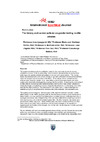Identificador persistente para citar o vincular este elemento:
https://accedacris.ulpgc.es/jspui/handle/10553/43165
| Título: | Review: The history and current policies on gender testing in elite athletes | Autores/as: | Ljungqvist, Arne Martínez Patiño, Maria José Martínez-Vidal, Aurora Zagalaz Sánchez, Luisa Díaz Pereira, Pino Mateos Padorno, Covadonga |
Clasificación UNESCO: | 5802 Organización y planificación de la educación | Palabras clave: | Gender identity Gender verification Sex determination Sex discrimination Sport |
Fecha de publicación: | 2006 | Publicación seriada: | International SportMed Journal | Resumen: | The purported rationale of sex verification tests in elite sports was to ensure women competed on equal terms by preventing male impostors masquerading as women from obtaining unfair gender-related advantages in women-only sports events. This review traces the developments and current policies on gender verification of elite women athletes since the inception of sex controls in the 1960s. In the advent of sex controls women athletes were forced to parade in the nude before a panel of gynaecologists and were subjected to traumatic and degrading visual genital inspections. Subsequently, screening of female athletes involved genetic-based laboratory testing which was initially based on a simple technique of evaluating a buccal smear for the presence of a Barr body, and more recently the determination of the presence of Y chromosomes or male-related genetic material using PCR amplification of chromosomal DNA extracted from nucleated cells. The publicity surrounding the notorious case of the Spanish national champion hurdler, Maria Patiño, in the 1980s prompted calls for the elimination of sex controls in elite sports. Maria Patiño, who was publicly humiliated when she failed her sex verification test due to androgen resistance, was stripped of her titles and disqualified from competing in women-only sport events, only to be reinstated 3 years later. By then, however, her career as a professional athlete was over. Maria Patiño's case and those of other athletes who had been unjustly excluded from competitive sport prompted changes in the regulations regarding sex verification which brought them in line with the development of elite sport and biomedical science. Women athletes with rare sex-related genetic abnormalities, such as 5-α-steroid-reductase deficiency, complete or almost complete androgen insensitivity, and chromosomal mosaicism, have no unfair gender-related advantages and should not be disqualified from competing in elite sports events. Nor should they be stigmatised and their right to privacy should be guaranteed by sports organizations during the process of gender verification. The abandonment of compulsory sex verification test of female athletes which was initiated by the International Association of Athletics Federations (IAAF) was later followed by most international sports federations, and in the end also by the International Olympic Committee (IOC), although initially only provisionally. The abandonment of sex verification tests brought an end to the traumatic, demeaning, and unjust regulations bringing them in line with advancements in sport, modern medicine, and science. | ISSN: | 1528-3356 | Fuente: | International SportMed Journal [ISSN 1528-3356], v. 7(3), p. 225-230 |
| Colección: | Artículos |
Citas SCOPUSTM
16
actualizado el 08-jun-2025
Citas de WEB OF SCIENCETM
Citations
12
actualizado el 25-feb-2024
Visitas
300
actualizado el 15-ene-2026
Descargas
288
actualizado el 15-ene-2026
Google ScholarTM
Verifica
Comparte
Exporta metadatos
Los elementos en ULPGC accedaCRIS están protegidos por derechos de autor con todos los derechos reservados, a menos que se indique lo contrario.
